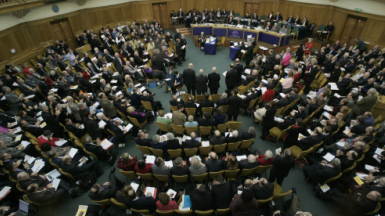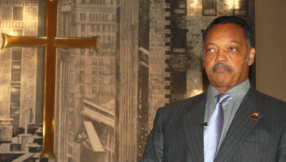
The Church of England has published a major report on human sexuality today.
The House of Bishops, which commissioned a working group to compile the report, announced back in January 2012 that it intended to draw together material from the Church of England and offer proposals on how the ongoing discussion about matters of sexuality might be best shaped.
The group was chaired by Sir Joseph Pilling, a former Permanent Secretary of the Northern Ireland Office, and its members included the Bishops of Gloucester, Birkenhead, Fulham and Warwick.
Professor Robert Song, the Ven Rachel Treweek and the Reverend Dr Jessica Martin were also invited to be advisors for the group.
During their work, members of the group gathered evidence from experts, groups and individuals and also met with a number of gay and lesbian people to gain an insight into their experiences.
The report considers the changing context within which the group undertook its work, and looks at homophobia as well as evidence from science, Scripture and theologians.
It offers 18 recommendations, the first of which welcomes gay and lesbian people in the Church.
"We warmly welcome and affirm the presence and ministry within the Church of gay and lesbian people, both lay and
ordained," it states.
"In our listening encounters, that sense of marginalisation of lesbian and gay people from the Church came across with considerable force.
"Whatever our own views and differences on the subject of human sexuality, it was not a message that any of us had intended to give or with which any of us could be comfortable. We do not differ from each other in our desire to welcome the presence and ministry of gay and lesbian people within the Church."
Three recommendations focus on the proposal for facilitated conversation, giving the opportunity for Christians who disagree on questions of sexuality to come to better understand one another's concerns.
Other recommendations call on the Church to actively work against homophobia and to repent for times that homosexuals have not been made welcome in the past.
The report also proposes that clergy, with the agreement of their Church Council, should be able to offer services to bless faithful same-sex relationships. Such services would not be required, however, and there is no liturgy in place.
"Anxiety about opening the way to celebrating relationships that do not conform to the church's teaching penalises those gay and lesbian Christians who steadfastly seek to live by that teaching in enduring and faithful relationships," the report states.
"And, in any event, the House of Bishops acknowledged, as long ago as 1991 in Issues in Human Sexuality, that
gay and lesbian lay Christians might in good conscience decide to enter into sexually faithful monogamous relationships.
"Moreover, some form of celebration of civil partnerships in a church context is widely seen as a practice that would give a clear signal that gay and lesbian people are welcome in church."
In a statement released alongside the report, the Archbishops of Canterbury and York said the Pilling report proposes "a process of facilitated conversations in the Church of England over a period of perhaps two years".
"The document offers findings and recommendations to form part of that process. It is not a new policy statement from the Church of England," they stressed.
The Archbishops note that "the issues with which the report grapples are difficult and divisive" and the document itself comments on the tension between the church's teaching on sexuality and with contemporary social attitudes.
Sir Pilling said that "disagreements have been explored in the warmth of a shared faith", and the Archbishops have commended this, saying they hope the ongoing discussion "will be characterised by a similar spirit".
The report has, however, already caused controversy in the Anglican community, as it marks the first time that the Church of England has been so explicit in its endorsement of homosexuality.
Included in the report is a dissenting statement from the Bishop of Birkenhead, the Right Reverend Keith Sinclair, who was unable to support all the recommendations made by the group as a whole.
"I am supportive of many of the report's recommendations and share many of the concerns driving the report as we wrestle with being faithful to Christ in our changing culture," he writes.
"I have no desire to see issues of human sexuality distracting us from proclaiming the good news of salvation in Jesus Christ. However, after much prayer and soul searching, I have concluded I cannot sign."
The bishop writes in his statement that he does not believe the report offers "a consistent or coherent response" to questions of the Church's response to sexuality, and he says he fears it will cause confusion "to many faithful Anglicans, particularly those who experience same sex attraction".
"As a pastor and friend to such people, I believe the Church should support and not undermine them," he said.
Peter Ould, an orthodox Anglican theologian and blogger, is disappointed with the report and says there are many "theological problems" with it, naming the Bishop of Birkenhead's dissenting statement as "the best bit".
"The problem with the recommendations as they stand is that they give priests a carte-blanche to have public services affirming sexual relationships outside of marriage," he said.
"It doesn't matter that there is no formal liturgy proposed - the fact that some of our clergy will be able to all intents and purposes publicly bless same-sex relationships means that the actual formal position of the Church of England will be irrevocably undermined.
"Furthermore, the Report simply doesn't know how to handle men and women like myself who, despite not being heterosexual, have made tough choices to fashion our lives in line with the biblical truth.
"By permitting church services to affirm sexual relationships, the Church of England is effectively abandoning those of us who have struggled to follow traditional Christian practice and telling us that we have made the wrong choice."
Julian Mann, orthodox Anglican blogger and Vicar of the Oughtibridge Parish Church, has said: "In humbled dependence upon Almighty God, and conscious of our own sin and weakness, we as orthodox Anglicans must oppose the conduct of services of same-sex blessing. These are contrary to God's word and dishonour Christ.
"We must oppose such services instead of consulting about them. The day these services come into use in the Church of England will be a terrible day for the Gospel."
Lee Gatiss, director of Church Society, welcomed the publication of the Pilling report and the opportunity to discuss it across the whole Church.
He called upon Anglicans read the report and its recommendations carefully.
"Like the apostle Jude, in the Bible, we would prefer to discuss the good news of Jesus Christ and the salvation he offers to all, but feel constrained to respond to the teaching of those who are changing the gospel into an affirmation of immoral behaviour," he said.
"We call on the church to read the report prayerfully, and to weigh its teaching and recommendations carefully in the light of scripture's very clear teaching on sexuality, to which the Church of England is committed in its canons, doctrinal formularies, Synodical statements, and the resolutions of the Lambeth Conference. We particularly commend to people the 'dissenting statement' in the report from the Bishop of Birkenhead, and thank him for its clarity and care. A further statement will be made in due course."
General Synod Member & Christian Concern chief executive Andrea Williams said the report effectively undermined the Church's official position on human sexuality, and would cause further division within the Church of England "rather than offering the courageous leadership that was required".
"Let's remember that Jesus Himself spoke with clarity, explaining that marriage is between a man and a woman and understood that this is the sexual relationship that God blesses (Matthew 19, Genesis 1)," she said.
"If the Church of England is genuinely committed to the flourishing of humanity, then she must imitate Christ, who honoured God and His authority in the face of pressure to conform to the world's standards. He knew that in doing this He was exercising compassion.
"The most compassionate thing for the Church of England to do is to follow Christ in this: speak clearly about marriage as the union of one man and one woman and the only proper place for sexual expression, for the good of all."
"We commend the Bishop of Birkenhead for distancing himself from the suggestion that the biblical witness concerning homosexual behaviour is unclear or ambiguous. The majority of Christians throughout the world and throughout history are committed to orthodox biblical teaching on marriage and sexuality."
Andrew Symes, Executive Secretary of Anglican Mainstream, released an initial response on behalf of the group: "The summary of the report that has been released suggests that a number of conclusions on the way forward have already been drawn, and that a programme of 'facilitated conversations' will enable people with different views on sexuality to remain in the church together.
"The impression is given that a matter on which Scripture and tradition give clear theological and ethical direction is open to compromise by negotiation. However we would like to take time to study the document in detail before giving a full response."
The House of Bishops will discuss the report for the first time in December of this year, and it will be further debated by the College of Bishops in January 2014.













